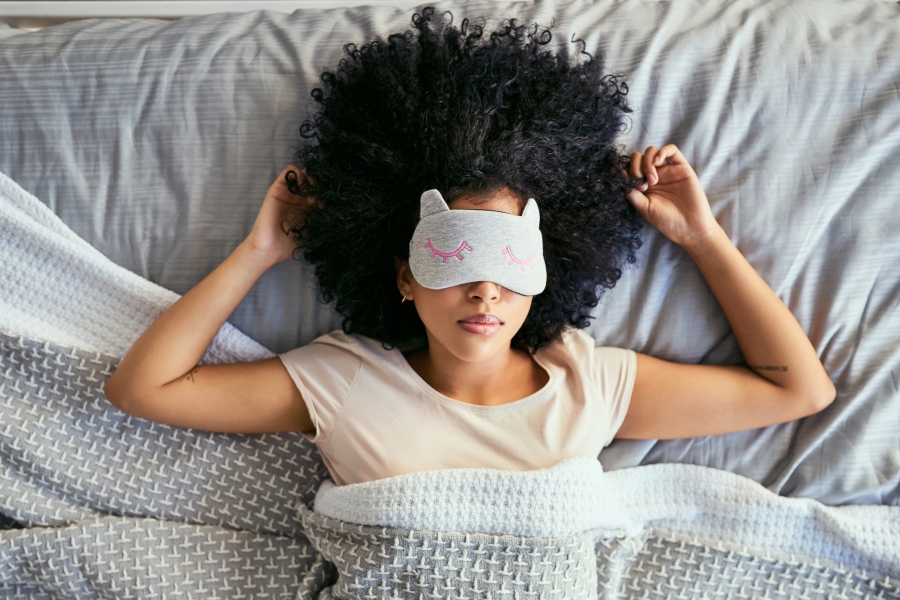As an obstetrician-gynecologist (OB-GYN), I care for patients at all stages of life, including menopause. While menopause is not a disease, I often help patients cope with symptoms that are causing discomfort or disruption in their lives, including sleep disruption.
While no two people experience menopause the same way, getting a good night’s rest is a common challenge. It affects about half of people during or after the menopause transition. Here’s what I tell my patients about menopause sleep disruption — and how to get the rest they need.
How menopause affects sleep patterns
Changes in hormones, including the decline in estrogen and progesterone levels as the body transitions into menopause, can affect sleep in many ways. Fluctuating hormones can lead to mood changes and problems regulating body temperature, both of which can cause poor sleep. Some of my patients also have changes in their circadian rhythm — the body’s natural sleep-wake cycle.
Common sleep challenges during menopause include:
- Night sweats. Hot flashes are the most common menopause symptom. They’re called night sweats when they happen at night and disrupt your sleep. When you have them, your upper body suddenly feels warm. And you might wake up sweating in bed.
- Insomnia. Trouble falling asleep and staying asleep is common during menopause. It’s often linked to stress or anxiety. Hormone changes during menopause can affect a person’s mood. The menopause years often coincide with other significant — and stressful — life changes people may experience in their health, home life, and careers.
- Restless leg syndrome (RLS). People with this condition have tingling sensations and unpleasant urges to move their legs for relief. However, moving the legs brings only temporary relief, and it can make it hard to sleep. RLS affects more than 50% of people who have transitioned to menopause. It may be triggered by changing hormone levels or iron deficiency.
- Sleep apnea. Changes in hormones during menopause affect the way the body uses calories, leading to weight gain and a higher risk of sleep apnea.
Sleep strategies for menopause
Sleep problems can disrupt your life and affect your health. So they should never be ignored. If you’re having trouble sleeping during menopause, tell your doctor. The right treatment depends on the cause of your sleep troubles.
Many sleep problems can be improved by adopting good sleep habits. And there are things you can do to reduce the impact of hot flashes at night. Here are some of the strategies I often suggest for my patients:
- Stay cool. Keep your bedroom quiet, dark, and cool. Choose lightweight bedding and breathable fabrics for sleeping. If sweating wakes you up at night, keep a glass of cool water and a fan in your bedroom.
- Stick to a sleep schedule. Go to bed and get up at the same time, even on weekends.
- Prioritize sleep. Remember to get to bed early enough to get at least 7 to 9 hours of shuteye nightly.
- Unwind with a relaxing routine. As bedtime approaches, get your body and your mind ready for sleep. You may want to engage in a relaxing activity as you begin to power down. Maybe reading a book, taking a warm bath, or listening to soothing music.
- Power down devices near bedtime. The light from phone, computer, and TV screens prompts your brain to stay awake.
- Ditch the nightcap. Even small amounts of alcohol can disrupt sleep and possibly worsen night flashes.
- Get moving. Exercising can help you sleep better. But don’t exercise too close to bedtime, as this may sabotage sleep.
What about medications?
If you’re still not sleeping soundly, your doctor might suggest a medication to help improve your snooze. Menopausal hormone therapy (MHT) can help with night sweats and sleep difficulties.
If you still have your uterus, you’ll likely need estrogen-progesterone combination therapy. Adding progesterone can decrease the risk of uterine cancer.
I often recommend Prometrium for progesterone. It contains peanut oil, so if you’re allergic to peanuts, you can try another type of progesterone.
Progesterone has a sedative effect. Taking it right before bedtime can help you sleep better.
MHT is a safe and effective option for many of my patients. But it’s important to discuss your individual risks and benefits with your provider, so you can choose the best approach for you.
If you decide not to take hormones or if you can’t for health reasons, you still have options. Non-hormonal medications, such as certain antidepressants, can help with night sweats.
Other treatments that may help you sleep better include:
- Melatonin supplements. Melatonin supplements are a synthetic version of a sleep hormone that the body makes naturally.
- Sleep aids. Prescription sleep medicine can help, but it isn’t a long-term solution.
- Cognitive behavioral therapy (CBT). CBT is a type of counseling that can help people manage thoughts and behaviors that interfere with sleep.
A skilled and caring provider to help you navigate menopause
Temple’s highly trained OB-GYNs would be honored to be your healthcare partner through menopause and every stage of life. To make an appointment with a Temple OB-GYN, call 800-TEMPLE-MED (800-836-7536) or schedule an appointment online.
Helpful Resources
Looking for more information?

